Back


Poster Session C - Monday Afternoon
Category: Liver
C0540 - Home Brew Gone Wrong: A Case Report on Potential Auto-Brewery Syndrome Sequelae
Monday, October 24, 2022
3:00 PM – 5:00 PM ET
Location: Crown Ballroom

Has Audio

Saif Ghias, MD
Los Robles Hospital and Medical Center
Thousand Oaks, CA
Presenting Author(s)
Saif Ghias, MD, Sobia Ashfaq, MD, Jasprit Takher, MD
Los Robles Hospital and Medical Center, Thousand Oaks, CA
Introduction: Auto-Brewery Syndrome (ABS) is a condition not often seen in medical practice. It involves the conversion of carbohydrates to alcohol by the intestinal microbiome in a subset of patients. However, when these patients deny any consumption of alcohol, they are often brushed off or worked up for other etiologies, including stroke or hypoglycemia. There are also many possible medical sequelae that are not as widely reviewed due to the rarity of this disease. These include symptoms of chronic alcohol consumption such as increased alcohol cravings addiction, possible neuropathy, and liver disease such as fatty liver disease or cirrhosis.
Case Description/Methods: In this case, we present a 26-year-old male with a history of auto-brewery syndrome presenting with bilateral lower extremity paralysis, sensation loss, and neuropathy. These symptoms were similar to an episode which was inconclusive. He consumed alcohol occasionally but was sober at that time. During that stay, he was diagnosed with auto-brewery syndrome. In ED, his blood alcohol was 493mg/dL, although he was sober for 1 year, and his liver function tests were significantly elevated with AST twice the level of ALT, consistent with findings of alcoholic liver injury. There was some return of neurological and hepatic function over the hospital stay with supportive care. He was placed on a consistent carbohydrate diet and his LFTs subsequently improved.
Discussion: While there is data on potential causes and causative organisms for this condition, there is little in the literature on the potential sequelae associated with auto-brewery syndrome. Chronic alcoholism and its effects are widely seen and studied. From alcohol neuropathy to cirrhosis, the effects of consistent alcohol consumption are deleterious to one’s health. The question that needs to be asked is: are patients with chronic exposure to endogenous alcohol at risk for the same complications seen in chronic alcoholism?
Cirrhosis, which is seen as a risk factor for ABS, may actually be a consequence of ABS. In this patient, his AST and ALT were mildly elevated, even during previous admission. Therefore, the patient may have been experiencing chronic liver injury from alcohol use while sober, placing him at increased risk for NASH and eventually cirrhosis at a much earlier onset than expected. It would be imperative in this case to ensure that the patient is on a limited intake of carbohydrates, or antifungals if necessary.
Disclosures:
Saif Ghias, MD, Sobia Ashfaq, MD, Jasprit Takher, MD. C0540 - Home Brew Gone Wrong: A Case Report on Potential Auto-Brewery Syndrome Sequelae, ACG 2022 Annual Scientific Meeting Abstracts. Charlotte, NC: American College of Gastroenterology.
Los Robles Hospital and Medical Center, Thousand Oaks, CA
Introduction: Auto-Brewery Syndrome (ABS) is a condition not often seen in medical practice. It involves the conversion of carbohydrates to alcohol by the intestinal microbiome in a subset of patients. However, when these patients deny any consumption of alcohol, they are often brushed off or worked up for other etiologies, including stroke or hypoglycemia. There are also many possible medical sequelae that are not as widely reviewed due to the rarity of this disease. These include symptoms of chronic alcohol consumption such as increased alcohol cravings addiction, possible neuropathy, and liver disease such as fatty liver disease or cirrhosis.
Case Description/Methods: In this case, we present a 26-year-old male with a history of auto-brewery syndrome presenting with bilateral lower extremity paralysis, sensation loss, and neuropathy. These symptoms were similar to an episode which was inconclusive. He consumed alcohol occasionally but was sober at that time. During that stay, he was diagnosed with auto-brewery syndrome. In ED, his blood alcohol was 493mg/dL, although he was sober for 1 year, and his liver function tests were significantly elevated with AST twice the level of ALT, consistent with findings of alcoholic liver injury. There was some return of neurological and hepatic function over the hospital stay with supportive care. He was placed on a consistent carbohydrate diet and his LFTs subsequently improved.
Discussion: While there is data on potential causes and causative organisms for this condition, there is little in the literature on the potential sequelae associated with auto-brewery syndrome. Chronic alcoholism and its effects are widely seen and studied. From alcohol neuropathy to cirrhosis, the effects of consistent alcohol consumption are deleterious to one’s health. The question that needs to be asked is: are patients with chronic exposure to endogenous alcohol at risk for the same complications seen in chronic alcoholism?
Cirrhosis, which is seen as a risk factor for ABS, may actually be a consequence of ABS. In this patient, his AST and ALT were mildly elevated, even during previous admission. Therefore, the patient may have been experiencing chronic liver injury from alcohol use while sober, placing him at increased risk for NASH and eventually cirrhosis at a much earlier onset than expected. It would be imperative in this case to ensure that the patient is on a limited intake of carbohydrates, or antifungals if necessary.
Disclosures:
Saif Ghias indicated no relevant financial relationships.
Sobia Ashfaq indicated no relevant financial relationships.
Jasprit Takher indicated no relevant financial relationships.
Saif Ghias, MD, Sobia Ashfaq, MD, Jasprit Takher, MD. C0540 - Home Brew Gone Wrong: A Case Report on Potential Auto-Brewery Syndrome Sequelae, ACG 2022 Annual Scientific Meeting Abstracts. Charlotte, NC: American College of Gastroenterology.
